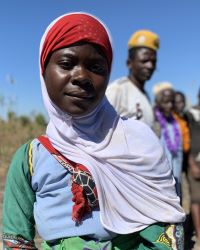Yao in Mozambique

Photo Source:
Anonymous
|
Send Joshua Project a map of this people group.
|
| People Name: | Yao |
| Country: | Mozambique |
| 10/40 Window: | No |
| Population: | 329,000 |
| World Population: | 3,862,000 |
| Primary Language: | Yao |
| Primary Religion: | Islam |
| Christian Adherents: | 1.40 % |
| Evangelicals: | 1.00 % |
| Scripture: | Complete Bible |
| Ministry Resources: | Yes |
| Jesus Film: | Yes |
| Audio Recordings: | Yes |
| People Cluster: | Bantu, Makua-Yao |
| Affinity Bloc: | Sub-Saharan Peoples |
| Progress Level: |
|
Introduction / History
The Yao have lived in northern Mozambique for hundreds of years. A close look at the history of the Yao people as a whole will show that their ethno geographic center is located in a small village called Chiconono, in the northwestern Mozambican province of Niassa. When Arabs arrived on the east coast of Africa they began trading with theYao people, mainly slave and ivory, in exchange for clothes and guns. Because of their involvement in this coastal trade they became one of the richest and most influential tribes in Southern Africa.
Large Yao kingdoms came into being as mighty Yao chiefs took control of the Niassa province of Mozambique in the 19th century. During that time the Yao began to move from their traditional home in today's Malawi and Tanzania, which resulted in the Yao populations they now have. The most important result of the great chiefdoms was the turning of the whole nation to Islam around the turn of the 20th century and after the 1st World War. Because of their trade with the Arabs, the Yao chiefs (sultans) needed scribes who could read and write Arabic. The Islam teachers who were employed and lived in the Yao villages, made a significant impact on the Yao people because they could offer them literacy, a holy book, smart clothes and a square, instead of round, houses.
Furthermore, the Yao sultans strongly resisted the Portuguese, British and German colonial rule, which was viewed as a major threat to them. The British, who were seen as Christians, tried to stop the slave trade by attacking some of the Yao slave caravans near the coast. They freed the slaves and confiscated the ivory, which the slaves had been transporting. The greater Yao chief Mataka decided that becoming a Christian would have a negative economic impact on his people, while Islam offered them a social system, which would assimilate their traditional culture. Because of the political and ritual domination of the chiefs, their conversion to Islam caused their subjects to do likewise.
Where Are they Located?
There are a minimum estimated 450,000 Yao people living in Mozambique. They largely occupy the eastern and northern part of the Niassa province and form about 40% of the population of Lichinga, the capital of this province.
What Are Their Lives Like?
The Mozambican Yao people are generally agricultural. Growing a good corn crop has everything to do with how a given family makes a living. Their level of production is mostly subsistence and therefore they basically eat what they grow. When a good corn crop is produced they sometimes will sell some of it on the local market in order to buy things that they do not produce themselves such as soap, salt and bicycles.
What Are Their Beliefs?
The Islam which the Yao of Mozambique have embraced, is not the orthodox religion, which is found in the countries such as Iran, Iraq, Saudi-Arabia, ect., but is totally intermingled with their traditional animistic belief system. It is often referred to as "Folk Islam."
What Are Their Needs?
The obvious need of the Yao people is a personal, hand-holding relationship with Jesus Christ, forsaking their practice of witchcraft and Islam. There is a need for missionaries who can patiently learn the Ciyawo language, develop relationships in the villages and make disciples by displaying the love of Christ, preaching the gospel and operating in the signs and wonders, as the Yao people are very "spiritual" people who have experienced the power of demonic forces in their lives and communities.
Prayer Points
Please pray that the Lord would remove the blindfolds which Satan has placed upon the hearts of the Yao people, and that laborers would be sent to plant seeds that would take root in fertile soil, and produce a great harvest of souls.
Pray for freedom from witchcraft, fear and envy.
Pray that the Lord would draw indigenous expressions of worship among new Yao believers as music was suppressed at the advent of Islam in their culture.
Pray that the chiefs, secretaries and Muslim leaders in every village would be saved and leverage their influence among the others in their village for the kingdom of God.